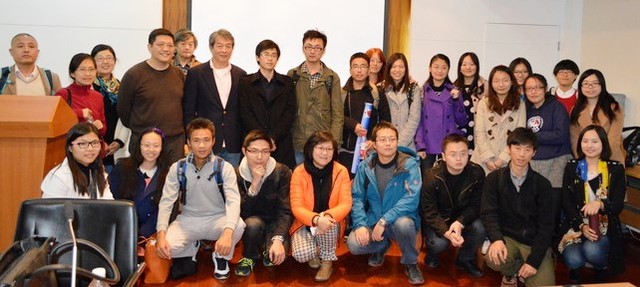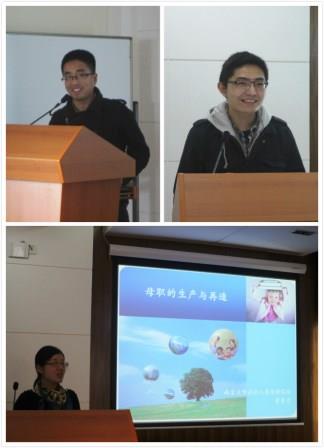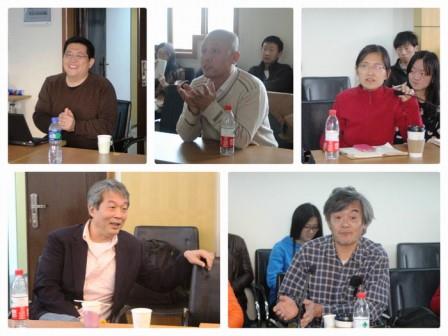
Held by the Research Institute of Social Anthropology, School of Social and Behavioral Sciences, Nanjing University and the Department of Sociology, School of Social Development and Public Policy, Fudan University, the second “Nanjing University--Fudan University Socio-cultural Anthropology Forum” convened on 16th November, 2013, in Art Science Hall, Fudan University. Prof. Pan Tianshu of Fudan University chaired the forum. Prof. Fan Ke, Prof. Shao Jing, and Prof. Chu Jianfang from Nanjing University, Dr. Zhu Jianfeng from Fudan University attended as guests. Three graduate students from Nanjing University presented their research: Tong Teng, Three Kinds of Halal--Anthropological Research of Hui Muslim from Northwest China in Nanjing; Cao Huizhong, The construction and Reconstruction of Motherhood; and Fang Haoming, What happened when country folks encounter machinery?. More than twenty anthropology graduate students from both Universities attended.
2013年11月16日,复旦大学文科楼,由南京大学社会学院社会人类学研究所联合复旦大学社会发展与公共政策学院社会学系主办的第二届“南京大学——复旦大学人类学新锐论坛”顺利举行。本院三位人类学专业研究生在“南京大学——复旦大学人类学新锐论坛”中进行了演讲,论坛由复旦大学潘天舒副教授主持,出席的嘉宾有南京大学范可教授、邵京教授、褚建芳副教授,复旦大学朱剑芳讲师。报告人及题目:仝腾(南京大学人类学硕士生),“三个‘清真’——南京市西北回族穆斯林的人类学研究”;曹慧中(南京大学人类学博士生),“母职的生产与再造”;方浩铭(南京大学人类学硕士生),“当‘乡下人’掌握机械时会发生什么事?”。来自南京大学和复旦大学的人类学专业研究生二十余人参与了旁听。
Tong Teng uses trade of beef and mutton as an example to explore many aspects of the halal economy of Hui Muslim and the halal culture behind it. Three kinds of halal are discussed in his speech: halal of Muslims from Northwest China, official halal, and international halal which represent three different powers which interweave and struggle with each other. He thinks the conception of halal is not stereotyped but genealogical. Halal is both experienced as localization and relocalization. The characteristics of Halal economy in Nanjing should be compared and investigated within the worldwide Islamic culture.
Cao Huizhong stared by introducing “mothering”, discussing the special connotations of pregnant body. She holds the opinion that when women are pregnant, the sexualized female body transfers to a de-sexualized body. According to solid evidence, she thinks that the pregnant body loses its power ofdiscourse and subjectivity while facing the stress from consumption, medicalization, socio-culture and self-examination.
Fang Haoming creates a new form of ethnography document by using literary writing style. The young generation from rural Hunan Province who work in other places (like Guangzhou and Ningbo) are his subjects. From participatory observation and interview, he focuses on the condition of that young generation of being immigrant, the change of their daily life, the transition of labor and communication patterns,and [their?] imagination about life when they encounter the invasion of modernity.
All audients welcomed talks and gave their comments and constructive suggestions in the end.
The Nanjing University--Fudan University Socio-cultural Anthropology Forum” could be one step forward towards forming academic community in the area of Yangtze River Delta. It is also an innovation in teaching anthropology in China.
仝腾以牛羊肉贸易为例,考察了回族穆斯林的“halal经济”的各方面及其背后的清真文化。其论述的三种“清真”——即西北穆斯林的清真、官方的清真、国际的清真,分别代表着三种不同的互相交织、博弈的力量。认为“清真”这一概念不是刻板的,而是谱系的(genealogy);清真是地方的,也是再地方化的(relocalization)。南京市的“halal经济”所表现的特点,值得放到世界伊斯兰文化中去比较和进一步考察。
曹慧中从“母职(mothering)”引入,讨论了母职意识形态文化霸权、城市中产阶级的密集母职和母职守门、母职的分类等核心概念,并以孕期身体在特殊阶段的特殊蕴意为研究案例,认为当女性处于孕育的特殊阶段时,“性化”的女性身体转为“去性化”的孕期身体,并试图通过实证资料来分析女性的孕期身体在消费社会、医疗机制、社会文化以及自我审视的四层裹挟之下,逐渐丧失了话语权和主体性。
方浩铭极具文学性地阐述田野发现,创新了传统民族志的书写形式。其研究对象主要为来自湖南省浦市镇、合水镇、潭溪镇,在外地(如宁波、广州)打工的年轻一代,通过参与式观察和访谈,关注由于移动带来的“移民/遗民”两极状况,以及在现代性的入侵之下,农村打工者日常生活的变革,劳动和互动模式的变迁,和对于生活的想象实践。

Photos: from upper left to lower right: Tong Teng, Fang Haoming, Cao Huizhogn (照片从左上至右下:仝腾、方浩铭、曹慧中)
报告完成后,嘉宾进行了点评。复旦大学潘天舒老师就“实验性的民族志”,朱剑锋老师就“为父之道(fatherhood)”给予报告人中肯意见,引发两校师生间热烈讨论。
此次“南京大学——复旦大学人类学新锐论坛”,推动长江三角洲地区人类学学术共同体形成,同时也在教学上做了有益探索。

Photos: from upper left to lower right: Prof. Pan Tianshu, Prof. Chu Jianfang, Dr. Zhu Jianfeng, Prof. Fan Ke, Prof. Shao Jing (照片左上至右下:潘天舒、褚建芳、朱剑锋、范可、邵京)
南京大学社会人类学研究所硕士研究生 宋寒昱

